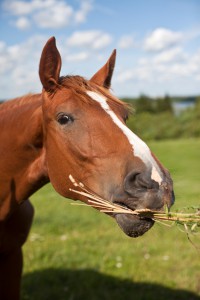Normally good natured, obedient and willing, changes in hormone levels can turn your darling horse into an unpredictable, grouchy nightmare! While some mares barely change during their season and are able to be ridden and handled as normal, others really suffer, showing signs of discomfort and changes in personality. Some of these issues, such as raising the tail, urinating frequently, and ‘winking’, represent the mares desire to breed, showing the males that she is receptive to their advances. These behaviours are usually coupled with a lack of concentration, and your mare being less willing to co-operate: her mind is on other things!  Moody Mare?[/caption] The mare is typically in season for 5-7 days, and behavioural issues will become worse as the ovarian follicles increase in size and higher levels of oestrogen are produced. The raise in oestrogen levels triggers the mares to release an egg, which usually happens during the last 2 days of oestrus. Once the egg is released, the mare starts producing more progesterone, the hormone which prepares the uterus for pregnancy. This stage is known as diestrus. At this point, the mare will no longer be receptive to the stallion. If the mare is not covered, or is covered unsuccessfully, hormonal changes reverse the changes to the uterus, and start the cycle again. Why don’t mares cycle all year round (and why some do!)? The gestation time (period that the female is pregnant) for a horse is 11 months, so the mare will not usually cycle over the winter in order to avoid having a foal during the months where weather is likely to be bad. Most mares will start cycling in the early spring, typically in March/April, and this will continue throughout the summer until October or November. This cycling is largely dependent on daylight hours, and mares can also be affected by artificial lighting- which can be used to bring them into season. Top tips when your mare is in season:
Moody Mare?[/caption] The mare is typically in season for 5-7 days, and behavioural issues will become worse as the ovarian follicles increase in size and higher levels of oestrogen are produced. The raise in oestrogen levels triggers the mares to release an egg, which usually happens during the last 2 days of oestrus. Once the egg is released, the mare starts producing more progesterone, the hormone which prepares the uterus for pregnancy. This stage is known as diestrus. At this point, the mare will no longer be receptive to the stallion. If the mare is not covered, or is covered unsuccessfully, hormonal changes reverse the changes to the uterus, and start the cycle again. Why don’t mares cycle all year round (and why some do!)? The gestation time (period that the female is pregnant) for a horse is 11 months, so the mare will not usually cycle over the winter in order to avoid having a foal during the months where weather is likely to be bad. Most mares will start cycling in the early spring, typically in March/April, and this will continue throughout the summer until October or November. This cycling is largely dependent on daylight hours, and mares can also be affected by artificial lighting- which can be used to bring them into season. Top tips when your mare is in season:
- If your mare gets sensitive when she is in season, try to plan competitions, lessons or outings avoiding these few days.
- For the couple of days where your mare’s behaviour is worst, it may be worth giving her a couple of days off, or doing low stress work- neither of you will enjoy a constant battle.
- Feeding certain herbs can help to control oestrus-related behaviour during the spring and summer, providing a natural way of maintaining hormonal balance, and keeping both you and your mare safe and happy!
My mare is a pain all year round- and it doesn’t seem to be affected by seasons, what should I give to her? To check to see if your mare’s behaviour is dictated by season, try keeping a diary to show you any patterns. If the behaviour is worse on similar days during her season, and this occurs on a 3-weekly basis, it is likely that hormones are causing the bad behaviour, and you should follow the tips above. If the behaviour doesn’t seem to be cyclical, we recommend you look for another cause- checking to see if your horse is in pain, if their diet needs adjusting or if you could handle them differently to help them to cooperate. Olivia Colton MSc Nutritional and Technical Coordinator At Feedmark all of our nutritional advisors are horse owners (though I am currently the only one silly enough to have mares!) and we are here to offer you feeding and supplement advice- either e-mail us at [email protected], or to have a chat to someone call the office on 0800 585525.











